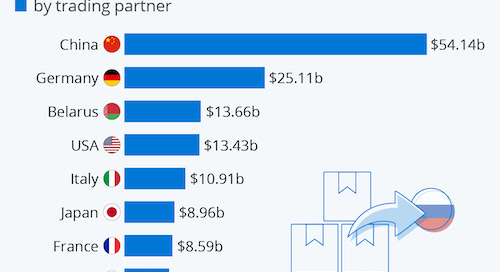Today’s posts that caught my eye:
A simple, true, and powerful WaPo analysis: In one week of war, Russia’s invasion of Ukraine may have veered history in a new direction.
'Biggest green deal since Paris': The UN is set to approve a plan to create the world's first ever global plastic pollution treaty, describing it as the most significant green deal since the 2015 Paris climate agreement, Reuters reports.
Apple announced that it will be holding its first event of 2022 on March 8. From MacRumors: “Apple is expected to announce the next-generation version of the iPhone SE, a revamped iPad Air, and at least one Mac with an Apple silicon chip, which could be the Mac mini, the 13-inch MacBook Pro, or both.”
Know someone who should check out the newsletter? Let them!
The World
One million people have fled Ukraine, the UN Refugee Agency said, as Russian forces pounded Kharkiv, Ukraine’s second-largest city, with airstrikes in a bid to break the will of the country’s resistance as Moscow’s offensive toward Kyiv stalled amid fierce Ukrainian counterattacks and logistics mishaps. Russian missile debris fell near Kyiv’s central train station on Wednesday night, damaging a major heating pipeline, with the blast wave breaking the station’s windows. Thousands of civilians, particularly women and children, are sheltering in the station at night as they await evacuation trains to western Ukraine. In the southern part of the country, Russian forces seized the first major Ukrainian city in their onslaught, the strategic southern port of Kherson. (Wall Street Journal, New York Times)
In one week of war, Russia’s invasion of Ukraine may have veered history in a new direction: Throughout Europe — even in staunchly neutral Switzerland — countries that depend heavily on Russia to heat people’s homes and power their economies banded together to isolate and punish the Russians for their aggression. Countries that just a few years ago rose up in protest over the arrival of migrants fleeing wars and extremism in the Middle East and North Africa are suddenly welcoming hundreds of thousands of refugees. “In less than one week, you’ve seen a fundamental shift as Europeans realize they have to take on more responsibility for their own defense,” said Steven Pifer, a former U.S. ambassador to Ukraine who is now a fellow at Stanford University’s Center for International Security and Cooperation. “In less than one week, you’ve seen five decades of German attitudes toward Russia turned on their head.” (Washington Post)
Amazon will support Ukraine’s cybersecurity as it battles a physical and online invasion from Russia, the company’s chief executive said. “We’re supporting humanitarian relief on the ground with cash donations from Amazon and our employees, logistics to get supplies to people needing them, and cybersecurity assistance to companies and governments,” Andy Jassy said. Meanwhile, FTSE Russell, MSCI all will remove Russian equities from benchmark indices, and Fitch cut its rating on Russia’s debt to “junk” status. (Financial Times)
Among Russia’s eight most important import partners, China and Belarus are the only two countries not participating in the wide-ranging sanctions against the country, after South Korea announced that it would join Western countries in banning Russian banks from the SWIFT network and “actively participate in the international community's efforts for a peaceful resolution of the situation.” (Statista)
The World Bank Group halted its programs in Russia and Belarus. The World Bank had partnered with Russia to help the country boost its economy and expand its role in the international domain. (Axios)
Keep reading with a 7-day free trial
Subscribe to Chris Riback's Newsletter to keep reading this post and get 7 days of free access to the full post archives.



